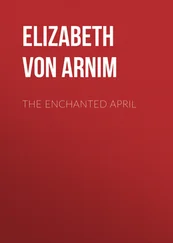Elizabeth von Arnim - In the Mountains
Здесь есть возможность читать онлайн «Elizabeth von Arnim - In the Mountains» — ознакомительный отрывок электронной книги совершенно бесплатно, а после прочтения отрывка купить полную версию. В некоторых случаях можно слушать аудио, скачать через торрент в формате fb2 и присутствует краткое содержание. Жанр: foreign_sf, foreign_antique, foreign_prose, на английском языке. Описание произведения, (предисловие) а так же отзывы посетителей доступны на портале библиотеки ЛибКат.
- Название:In the Mountains
- Автор:
- Жанр:
- Год:неизвестен
- ISBN:нет данных
- Рейтинг книги:4 / 5. Голосов: 1
-
Избранное:Добавить в избранное
- Отзывы:
-
Ваша оценка:
- 80
- 1
- 2
- 3
- 4
- 5
In the Mountains: краткое содержание, описание и аннотация
Предлагаем к чтению аннотацию, описание, краткое содержание или предисловие (зависит от того, что написал сам автор книги «In the Mountains»). Если вы не нашли необходимую информацию о книге — напишите в комментариях, мы постараемся отыскать её.
In the Mountains — читать онлайн ознакомительный отрывок
Ниже представлен текст книги, разбитый по страницам. Система сохранения места последней прочитанной страницы, позволяет с удобством читать онлайн бесплатно книгу «In the Mountains», без необходимости каждый раз заново искать на чём Вы остановились. Поставьте закладку, и сможете в любой момент перейти на страницу, на которой закончили чтение.
Интервал:
Закладка:
The effect of this on some one called Eugenius was to send him home a new man, full of resolutions to devote himself wholly to God; for 'I never, says Eugenius, was so deeply affected with the wisdom and importance of religion as when I saw how poorly and meanly the learned Octavius was to leave the world through the want of it.'
So Law went with me, and his vivacious pages,—the story of Octavius is but one of many; there is Matilda and her unhappy daughters ('The eldest daughter lived as long as she could under this discipline,' but found she couldn't after her twentieth year and died, 'her entrails much hurt by being crushed together with her stays';) Eusebia and her happy daughters, who were so beautifully brought up that they had the satisfaction of dying virgins; Lepidus, struck down as he was dressing himself for a feast; the admirable Miranda, whose meals were carefully kept down to exactly enough to give her proper strength to lift eyes and hands to heaven, so that 'Miranda will never have her eyes swell with fatness or pant under a heavy load of flesh until she has changed her religion'; Mundamus, who if he saw a book of devotion passed it by; Classicus, who openly and shamelessly preferred learning to devotion—these vivacious pages greatly enlivened and adorned my day. But I did feel, as I came home at the end of it, that Dr. Johnson, for whom no one has more love and less respect than I, ought to have spent some at least of his earlier years, when he was still accessible to reason, with, say, Voltaire.
Now I am going to bed, footsore but glad, for this picnic to-day was a test. I wanted to see how far on I have got in facing memories. When I set out I pretended to myself that I was going from sheer considerateness for servants, because I wished Mrs. Antoine to have a holiday from cooking my dinner, but I knew in my heart that I was making, in trepidation and secret doubt, a test. For the way to this place of larches bristles with happy memories. They would be sitting waiting for me, I knew, at every bush and corner in radiant rows. If only they wouldn't be radiant, I thought, I wouldn't mind. The way, I thought, would have been easier if it had been punctuated with remembered quarrels. Only then I wouldn't have gone to it at all, for my spirit shudders away from places where there has been unkindness. It is the happy record of this little house that never yet have its walls heard an unkind word or a rude word, and not once has anybody cried in it. All the houses I have lived in, except this, had their sorrows, and one at least had worse things than sorrows; but this one, my little house of peace hung up in the sunshine well on the way to heaven, is completely free from stains, nothing has ever lived in it that wasn't kind. And I shall not count the wretchedness I dragged up with me three weeks ago as a break in this record, as a smudge on its serenity, but only as a shadow passing across the sun. Because, however beaten down I was and miserable, I brought no anger with me and no resentment. Unkindness has still not come into the house.
Now I am going very happy to bed, for I have passed the test. The whole of the walk to the larches, and the whole of the way back, and all the time I was sitting there, what I felt was simply gratitude, gratitude for the beautiful past times I have had. I found I couldn't help it. It was as natural as breathing. I wasn't lonely. Everybody I have loved and shall never see again was with me. And all day, the whole of the wonderful day of beauty, I was able in that bright companionship to forget the immediate grief, the aching wretchedness, that brought me up here to my mountains as a last hope.
August 14th.
To-day it is my birthday, so I thought I would expiate it by doing some useful work.
It is the first birthday I've ever been alone, with nobody to say Bless you. I like being blessed on my birthday, seen off into my new year with encouragement and smiles. Perhaps, I thought, while I dressed, Antoine would remember. After all, I used to have birthdays when I was here before, and he must have noticed the ripple of excitement that lay along the day, how it was wreathed in flowers from breakfast-time on and dotted thick with presents. Perhaps he would remember, and wish me luck. Perhaps if he remembered he would tell his wife, and she would wish me luck too. I did very much long to-day to be wished luck.
But Antoine, if he had ever known, had obviously forgotten. He was doing something to the irises when I came down, and though I went out and lingered round him before beginning breakfast he took no notice; he just went on with the irises. So I daresay I looked a little wry, for I did feel rather afraid I might be going to be lonely.
This, then, I thought, giving myself a hitch of determination, was the moment for manual labour. As I drank my coffee I decided to celebrate the day by giving both the Antoines a holiday and doing the work myself. Why shouldn't my birthday be celebrated by somebody else having a good time? What did it after all matter who had the good time so long as somebody did? The Antoines should have a holiday, and I would work. So would I defend my thoughts from memories that might bite. So would I, by the easy path of perspiration, find peace.
Antoine, however, didn't seem to want a holiday. I had difficulty with him. He wasn't of course surprised when I told him he had got one, because he never is, but he said, with that level intonation that gives his conversation so noticeable a calm, that it was the day for cutting the lawn.
I said I would cut the lawn; I knew about lawns; I had been brought up entirely on lawns,—I believe I told him I had been born on one, in my eagerness to forestall his objections and get him to go.
He said that such work would be too hot for Madame in the sort of weather we were having; and I said that no work on an object so small as our lawn could be too hot. Besides, I liked being hot, I explained—again with eagerness—I wanted to be hot, I was happy when I was hot. ' J'aime beaucoup, I said, not stopping in my hurry to pick my words, and anyhow imperfect in French, ' la sueur .'
I believe I ought to have said la transpiration, the other word being held in slight if any esteem as a word for ladies, but I still more believe that I oughtn't to have said anything about it at all. I don't know, of course, because of Antoine's immobility of expression; but in spite of this not varying at what I had said by the least shadow of a flicker I yet somehow felt, it was yet somehow conveyed to me, that perhaps in French one doesn't perspire, or if one does one doesn't talk about it. Not if one is a lady. Not if one is Madame. Not, to ascend still further the scale of my self-respect enforcing attributes, if one is that dignified object the patrone .
I find it difficult to be dignified. When I try, I overdo it. Always my dignity is either over or under done, but its chief condition is that of being under done. Antoine, however, very kindly helps me up to the position he has decided I ought to fill, by his own unalterable calm. I have never seen him smile. I don't believe he could without cracking, of so unruffled a glassiness is his countenance.
Once, before the war—everything I have done that has been cheerful and undesirable was before the war; I've been nothing but exemplary and wretched since—I was undignified. We dressed up; and on the advice of my friends—I now see that it was bad advice—I allowed myself to be dressed as a devil; I, the patrone ; I, Madame. It was true I was only a little devil, quite one of the minor ones, what the Germans would call a Hausteufelchen ; but a devil I was. And going upstairs again unexpectedly, to fetch my tail which had been forgotten, I saw at the very end of the long passage, down which I had to go, Antoine collecting the day's boots.
Читать дальшеИнтервал:
Закладка:
Похожие книги на «In the Mountains»
Представляем Вашему вниманию похожие книги на «In the Mountains» списком для выбора. Мы отобрали схожую по названию и смыслу литературу в надежде предоставить читателям больше вариантов отыскать новые, интересные, ещё непрочитанные произведения.
Обсуждение, отзывы о книге «In the Mountains» и просто собственные мнения читателей. Оставьте ваши комментарии, напишите, что Вы думаете о произведении, его смысле или главных героях. Укажите что конкретно понравилось, а что нет, и почему Вы так считаете.












